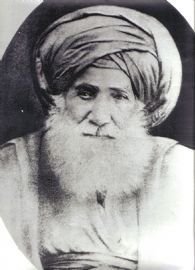A Short Tribute
Hacham Abdallah Somech, son of Hacham Avraham Somech, born in Baghdad in 1813, distinguished himself as Hacham Yaakov Rofeh's star pupil. He studied diligently and did not have to worry about a livelihood, since his father provided him with ample support; he became known early in life for his Torah knowledge and wisdom.
He initially also dealt in commerce, as an associate of famed businessman Moses Cabeza. When he realized that Torah learning in Babylonia (Iraq) was becoming lax because of its lack of a rabbinic seminary, he was stirred by religious and loving fervor, chose ten young men and began teaching them Torah intensively, requesting no pay.
Yehezkel Reuven Ben Menashe, the renowned philanthropist, was in Baghdad at the time, and became captivated by the efforts Hacham Ovadia Somech was investing. In 1840 he purchased a courtyard and had a rabbinic beit midrash constructed, named Midrash Abu Menashi, dedicating it to Torah scholar Abdallah Somech. In 1854 Menashe Yehezkel, his son, closed down that study house and had a large synagogue built, which he named Midrash Abu Menashi, next to which a large rabbinic seminary - named Midrash Beit Zlicha - was constructed. The seminary became increasingly famous and numerous students, thirsting for the words of the great teacher Hacham Abdallah, teemed to it from all cities of Babylonia and beyond. Numerous rabbis trained in the seminary were to serve in Babylonia and in other countries, including Rabbi Eliyahu Manny (Rabbi of Hebron) and Hacham Yoseph Haim, known as the Ben Ish Hai.
Hacham Abdallah passed away on a Sabbath Eve, on 18 Elul 5649 (1889) and his funeral was held the following night, when the Sabbath ended. The sage was buried in the courtyard of Yehoshua Cohen Gadol's grave, next to his master, Hacham Yaakov Harofeh. At the time of his burial, amazing events occurred in Baghdad that shook the Jewish world - Babylonia, Kushta and London, in particular. The sage's corpse was removed from its resting place by the Pasha's order; several notables of the Jewish community and some of the sage's students were arrested for an extended period of time. Three months later, the Kushta government ousted the Pasha because of his hostile attitude to the Jewish community, and had the sage buried in the Land of Israel.
Following his death, two chapters of his book, Zivchei Tzedek, were published. Two additional chapters remain in manuscript form. The book contains rulings on the Shulchan Aruch in Yoreh De'ah, and ends with several responsa on the four parts of the Shulchan Aruch. Additional manuscripts include Etz HaSadeh – on Tractate Beitza and original commentary on many of the Talmudic tractates; a commentary on the Passover Haggadah; Hazon LaMo'ed – on the method to establish leap years, and Questions and Answers, which includes hundreds of responsa from throughout the Mizrachi diaspora. Two volumes of responsa that were kept in his study disappeared during World War I.
